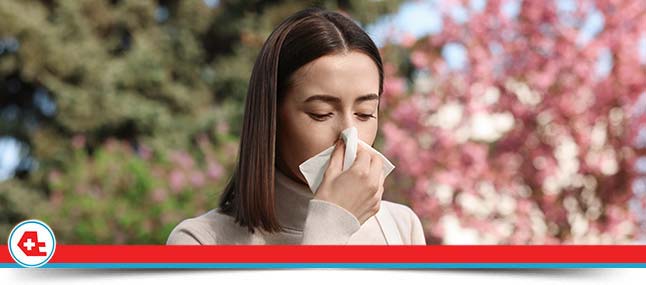Does Blowing Your Nose Make Cold Symptoms Worse?
Blowing your nose too forcefully can sometimes worsen cold symptoms by increasing nasal inflammation and pushing mucus into the sinuses, potentially leading to more congestion or even a sinus infection. If you experience persistent or severe symptoms, our healthcare professionals at Quick Family Urgent Care are available to provide personalized care and guidance. We are dedicated to ensuring you receive the appropriate treatment and support for a swift recovery. For more information, contact us or schedule an appointment online. We are conveniently located at 4301 S Flamingo Rd #102, Davie, FL 33330.


Table of Contents:
Does blowing your nose increase mucus production or make it thicker?
Can blowing your nose help get rid of a cold faster?
What are the signs your cold is getting better?
Is it better to let your nose run when you have a cold?
When should I go to urgent care for a cold?
Blowing your nose is a common response to nasal congestion, often associated with colds, allergies, or sinus infections—conditions frequently treated at Quick Family Urgent Care. Understanding the effects of nose blowing can help our patients manage these symptoms more effectively.
We emphasize that while blowing your nose helps clear mucus, it does not directly increase mucus production. Mucus production is primarily a response to irritants or infections, such as viruses, bacteria, or allergens. These trigger the mucous membranes to produce mucus as a protective mechanism. Blowing your nose helps expel this mucus but can sometimes make it appear thicker. This happens because the action of blowing can expel more of the water content, leaving behind a denser residue.
We advise our patients that frequent or aggressive nose blowing can irritate the nasal tissues, potentially leading to inflammation. This inflammation might prompt mucous membranes to produce more mucus, creating a cycle of congestion. To break this cycle, we recommend gentle techniques for clearing nasal passages, staying hydrated, and using saline nasal sprays or humidifiers. These methods can help keep mucus thin and manageable, reducing the need for excessive force when blowing your nose.
Nasal congestion during a cold is your body’s natural response to a viral infection, leading to inflammation and mucus production. This mucus is essential as it traps viruses and bacteria, preventing them from penetrating deeper into your respiratory system. While blowing your nose can offer temporary relief by clearing excess mucus and making breathing easier, it’s important to remember that this does not shorten the cold’s duration. The length of a cold is primarily influenced by your immune system’s response to the virus.
We advise our patients to blow their noses gently, one nostril at a time, using soft tissues to prevent skin irritation and reduce the risk of pushing mucus into the sinuses or ear canals, which can cause discomfort or lead to secondary issues.
In addition to careful nose-blowing, we recommend maintaining good hydration, getting ample rest, and considering the use of saline nasal sprays or humidifiers to ease symptoms. These methods can enhance comfort and help you manage symptoms as your body fights the infection.
Recognizing the signs of improvement can help reassure you that you’re on the mend. As your cold begins to subside, you might notice a gradual reduction in symptoms. Your runny or stuffy nose will start to clear up, meaning fewer tissue runs and your sore throat will become less painful, making swallowing more comfortable.
It’s also a positive sign when your cough decreases in frequency and intensity, indicating your respiratory system is healing. If fatigue and body aches have been an issue, you should start feeling a return of energy, making it easier to get back to your usual activities. As your nasal passages clear, your sense of taste and smell should improve, and any fever you experience will likely subside, bringing your body temperature back to normal. An improved appetite is also common, as your body feels better and requires nutrients for recovery.
Additionally, you might notice changes in mucus production. As you recover, mucus becomes clearer and less viscous, a sign that your immune system is effectively combating the virus. At Quick Family Urgent Care, we’re here to ensure you’re supported throughout your recovery. If you have concerns or need additional care, our team is ready to assist you.
When dealing with a cold, a runny nose is a common symptom that can be both bothersome and inconvenient. At Quick Family Urgent Care, we understand how this can impact daily life and we’re here to help you find effective relief. It’s important to recognize that a runny nose is often part of your body’s natural defense mechanism. When viruses infect the nasal passages, your body produces mucus to trap and expel these virus particles, preventing them from moving deeper into the respiratory system.
While allowing your nose to run can be beneficial for expelling viruses, we also acknowledge the discomfort it can cause. Our healthcare professionals can provide personalized advice on how to best manage your symptoms. Simple measures like gently blowing your nose with tissues can help clear out mucus but should be done carefully to avoid irritation. Staying hydrated is another key strategy, as it helps thin the mucus, making it easier to expel and reducing congestion. Additionally, using a saline spray can moisturize nasal passages and assist in clearing mucus more effectively.
When deciding whether to visit Quick Family Urgent Care for a cold, understanding the severity of your symptoms can be crucial for your health and peace of mind. While most colds are caused by viral infections and tend to resolve on their own with rest and time, there are specific circumstances where seeking urgent care is recommended. Quick Family Urgent Care is here to help if you experience severe or unusual symptoms, such as difficulty breathing, chest pain, or a persistent high fever that doesn’t respond to over-the-counter medications.
If you have a compromised immune system due to conditions like diabetes, or HIV, or are taking medications that suppress your immune system, it’s important to be more vigilant. Quick Family Urgent Care can provide the necessary medical evaluation and care you need. Additional symptoms that may require a visit include a severe headache, stiff neck, ear pain, or a sore throat that makes swallowing difficult, as these could indicate complications needing professional attention.
Consider the duration of your symptoms as well; if a cold persists beyond ten days without improvement or worsens after a brief recovery, Quick Family Urgent Care is ready to assist you. Moreover, if new symptoms arise, such as a rash, or if you’re unable to keep fluids down due to vomiting, visiting us can help prevent further complications. Our team is committed to providing compassionate and comprehensive care to ensure your health and well-being. For more information, contact us or schedule an appointment online. We are conveniently located at 4301 S Flamingo Rd #102, Davie, FL 33330. We serve patients from Davie FL, Pembroke Pines FL, Miramar FL, Pine Island Ridge FL, Plantation FL, Sunrise FL, and surrounding areas.
Check Out Our 5 Star Reviews







